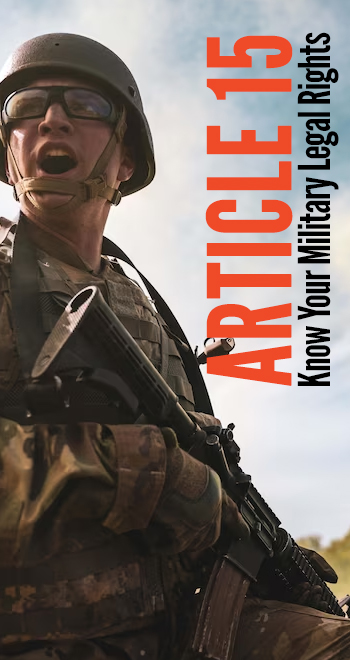Military Court-Martial Overview
What are the Types of Military Court Martial?
There are Three types of Court-Martial: Summary, Special, and General
A Court-Martial is often a life-altering and career-affecting event. A Court-Martial has the potential to take away rank, pay and freedom, and depending on the type of court-martial a conviction could result in the accused receiving a Dishonorable or a Bad Conduct Discharge. Servicemembers facing a Court-Martial should seek out the best and most experienced civilian military defense counsel they can find.

Article 15 Overview
Article 15 Proceedings: Know Your Rights
Servicemembers have the right to refuse Article 15 and request their case be tried before a court-martial. Servicemembers have up until the time their punishment is announced to make this refusal. Otherwise, they will no longer have the right to a trial by court-martial.
Article 15: Non-Judicial Punishment Penalties
In the Army and Air Force, non-judicial punishment can only be imposed by a commanding officer. That means an officer who is on actual orders, designating them as a “commander.” In the Navy and Marine Corps, Non-judicial punishment may be imposed by an “Officer in Charge.”
Article 15: Non-Judicial Punishment Appeal
If your Commanding Officer imposes punishment against you at non-judicial punishment (“NJP”) and you believe the punishment is “unjust” or “disproportionate” to the offense, then you have the right to appeal the non-judicial punishment to the next highest authority.
Desertion: Understanding Your Rights
Simply stated, Desertion exists when a servicemember is in an unauthorized absence status from their unit and chooses to remain away permanently, to avoid hazardous duty, or to shirk important service. Unlike being AWOL under Article 86 where the length of time in an AWOL status is the main issue, under Article 85 the key issue is whether the accused intended to “remain away permanently.” The legal determination of “intent to remain away permanently” “hazardous duty” and “important service” is based on the specific facts of each case.
UA/AWOL Status
No matter the reason for leaving the command without authorization, the command will report the servicemember’s UA or AWOL status into a national data base. Therefore, if a servicemember in a UA or AWOL status is pulled over for the most minor traffic violation he/she may be immediately arrested and jailed by civilian authorities until the servicemember is picked up by the military. Once picked up by the military the servicemember will probably be placed in the brig on base until your UA or AWOL charges are resolved.
Military Servicemembers Credit Protections
A Guide to the FCRA for Military Service Members
Serving in the military shouldn’t hurt your credit score. This guide explains how the Fair Credit Reporting Act (FCRA) protects active duty personnel with free credit monitoring, safeguards against debt collection issues, and limitations on interest rates, empowering them to build a strong financial future.
Understanding the Servicemembers Civil Relief Act (SCRA)
Facing financial burdens while serving your country? The Servicemembers Civil Relief Act (SCRA) has your back! This powerful law eases financial stress for active duty personnel and their families, offering protections on interest rates, foreclosures, evictions, and more. Empower yourself with knowledge and utilize the SCRA to navigate challenges with confidence.
BAH FRAUD | OHA FRAUD
BAH Fraud and OHA Fraud are prosecuted under False Official Statements and Larceny statues.
In order to be convicted, the government must prove that the servicemember completed the necessary allowance claim forms with the “intent to deceive.” In short, it is not sufficient for the government to simply show that the servicemember completed the form(s) incorrectly, but that the servicemember filled out evidentiary documents with the intent to deceive.
Claims Against the Military
Understanding the Federal Tort Claims Act (FTCA)
The FTCA generally prohibits active duty service members from suing the military for injuries sustained on duty. This safeguards the military’s structure and facilitates efficient dispute resolution within the chain of command. However, exceptions exist.
Navigating the Military Claims Act
The Military Claims Act (MCA), is a crucial piece of legislation protecting both service members and civilians in situations involving harm or damage caused by military personnel or activities. This comprehensive guide, written specifically for active duty service members, aims to demystify the MCA and empower you with knowledge.
Gun Rights
Ways You Can be Denied a Gun
If you are a military service member, a police officer or just an avid gun owner, being found guilty (either by pleading guilty or being convicted by a judge or jury) of certain crimes in California can terminate your right to own a gun and require you to relinquish the current guns you own.
A legal practitioner’s guide to the Lautenberg Amendment
The Gun Control Act of 1968 was the foundation for gun control in the United States and is best known for prohibiting convicted felons from possessing firearms. However, few people realize that there was a Public Interest Exception built into the law. Specifically, the Gun Control Act of 1968 allowed military personnel, law enforcement personnel, and other government employees who were required to possess a firearm for official use, to continue to possess firearms despite a felony conviction.







